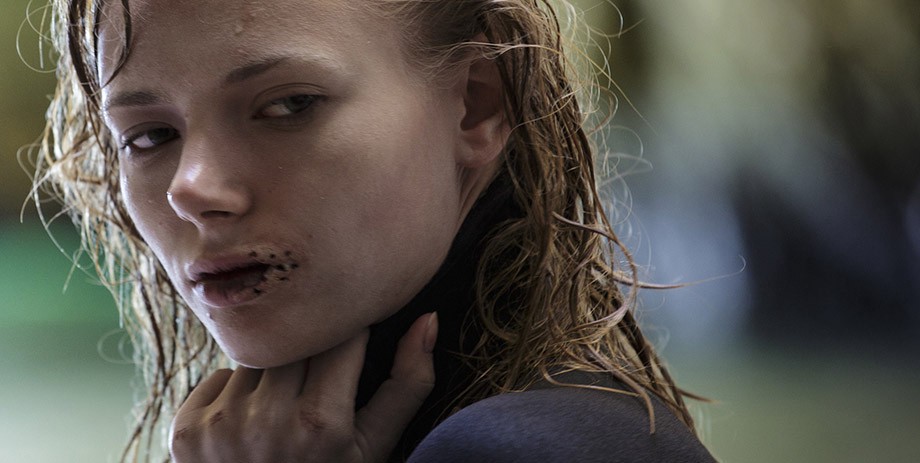Grazia Tricarico attended the University of Milan and the Centro Sperimentale di Cinematografia in Rome. She has directed the short films Brightbox (2009), L’arte marziale (2010), Michele nella terra (2012), Bios (2013), Mona Blonde (2014), and Persefone (2014).
In Persefone, a dark fable rendered in golden, sun-kissed images, a young diver on the coast of the Adriatic in southern Italy finds another kind of natural wonder amidst the bounty of the sea: a beautiful woman. As his strange romantic obsession grows, he withdraws ever further into silence. (TIFF official site)
The 18-minute short Persefone will play at the Toronto International Film Festival on September 8 and 13.
WaH: Please give us your description of the film playing.
GT: The dead body is an object of love. Persefone is erotic matter. Sexual desire, the life-instinct, is reflected in its opposite
and sometimes transformed by it. In mythical terms, eros and thanatos act for
us or drive us to action. Nicandro, the film’s protagonist, is animated by
these two opposing forces that in the end merge again. He is the boy-king of
this mythical space who abandons himself to his own nature and falls into ruin,
a victim of the morals that he has ingested.
WaH: What drew you to this story?
GT: I have a deep fascination for the dark nature of human beings. I
would like to explore the ancestral drives of humanity, those that we are forced
to condemn and remove by society as if they didn’t exist. I believe that we
need to face them instead. In this sense, the body is the protagonist. In the
case of my film Persefone, it’s the dead body, sexuality, eroticism.
Per Foucault: “Eroticism implies the experience of the finality
of being, of its limits and transgressions.”
I believe that in today’s eroticism, there are no possible forms
of transgression left. One cannot speak anymore of natural and unnatural. It is
important to abandon ethical prejudices and analyze the gut instincts we hide
and fear: Where do they come from and why? What follows from them?
WaH: What was the biggest challenge in making the film?
GT: Telling this story lucidly, avoiding the cliché of a necrophilic monster who kills, mutilates, and rapes his victims.
To be able to do so, I fed on many case studies of necrophilia,
letters, confessions, psychological essays. I visited several online forums. It
was all very enlightening. There are various types of necrophilia, not always in
combination with violence. In fact, quite often it is full of romanticism. In many cases, the necrophile individual is driven by a strong
desire to give life back to the flesh through an ultimate act of love. It is a
complex paradox, but necrophilia, in a certain sense, is the result of its
opposite: biophilia.
WaH: What do you want people to think about when they are leaving the theatre?
GT: It would be enough for me if people think [at all] as they leave the
cinema. I am in no position to provide answers. What I would like to do is
share some questions with the audience — ethical, political, existential
questions, and the emotional states deriving from them. I would like the
audience to elaborate on the film on a totally personal, subjective level. I think
it is not the director who makes the film, but the viewers in their minds. I can
only offer a few tools, a stimulus for reflection.
WaH: What advice do you have for other female directors?
GT: I don’t have enough experience to be able to give advice, but I
would make the same suggestions to female and male directors. Keep your
integrity. Be true to your own ideas, even if they aren’t widely shared. Take
risks, and be prepared to bear the consequences. That is the spirit I try to
work with.
WaH: What’s the biggest misconception about you and your work?
GT: I am not sure there are any misunderstandings about me yet, but
I often catch questioning glances from people, as if they were saying: “What are you are hiding?” I think they read a certain dark side of me. But I have
found a way to exorcise that: I am not dangerous. Perhaps.
Concerning my work, misunderstandings tend to arise from
language and in particular pertain to the narrative texture of my stories.
Following screenings, I am often told that my viewpoint is closer to video art
than to cinema. I think that is because I want to explore a fluid narration, an
approach to storytelling that leaves space for the viewer to interact with the
film autonomously and make it part of his or her own thoughts.
WaH: How did you get your film funded?
GT: Persefone is my master’s thesis for the Centro
Sperimentale di Cinematografia in Rome and was produced by CSC Production, the
school’s production company. I also received support from the Apulia Film
Commission and — in a very peculiar case — by a restaurant owner in Florence, Roberto
Vocino, who believed in the project and in me.
WaH: Name your favorite women directed film and why.
GT: Red Road (2006) by Andrea Arnold is a powerful film — a
forcefully expressive first feature. A formal but fragmented construction, it
uses crude and strong brushstrokes to capture a prohibited and gruesome
microcosm.







